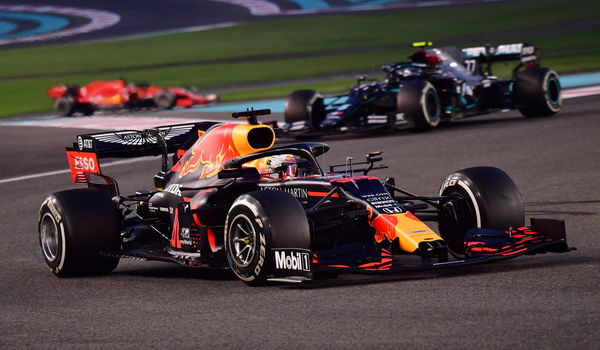
via Reuters
Formula One F1 – Abu Dhabi Grand Prix – Yas Marina Circuit, Abu Dhabi, United Arab Emirates – Red Bull’s Max Verstappen in action during the race Pool via REUTERS/Giuseppe Cacace

via Reuters
Formula One F1 – Abu Dhabi Grand Prix – Yas Marina Circuit, Abu Dhabi, United Arab Emirates – Red Bull’s Max Verstappen in action during the race Pool via REUTERS/Giuseppe Cacace
The F1 Commission unanimously approved Red Bull’s engine development freeze proposal on February 11. This would see the engine development of all engine manufacturers in F1 get halted at the end of 2021.
This move will allow Red Bull to take over the running of Honda’s engines from 2022. Honda will pull out of the sport at the end of 2021.
Honda had announced their intentions to exit the sport in October 2020. This prompted Red Bull to outline their plans of taking over the intellectual property of the Japanese manufacturer’s power units.
ADVERTISEMENT
Article continues below this ad
What is the engine development ‘freeze’ in F1?
An engine development freeze essentially bans further engine development in a particular time period. This will be a blanket embargo and all the engine manufacturers in F1 won’t be able to do any development on their engines.
At present, there are four engine manufacturers in F1. They are Mercedes, Honda (nominally until Red Bull takes over in 2022), Renault, and Ferrari.
Why did Red Bull put forward this proposal?
Once Red Bull takes over the running of Honda’s engines in 2022, Red Bull will be responsible for further updates on the engine for each new season.
Red Bull have repeatedly said that they can’t handle the costs involved in further updating the engine each season. So, Red Bull put forward this proposal. Initially, there was opposition to this proposal with Ferrari and Renault the notable voices.

via Imago
On June 26, Max Verstappen turned the picture-perfect cobbled streets of Graz into a makeshift racetrack as Aston Martin Red Bull Racing announced its arrival in Austria for its home grand prix this weekend. Behind the wheel of the RB7, the driver turned the usually peaceful city into a roar of F1 as he tore up the iconic Schlossberg. Verstappen was joined on the day by Scuderia Toro Rosso duo Daniil Kvyat and Alexander Albon. // Aston Martin Red Bull Racing’s Max Verstappen (the Netherlands) prepares to drive during the F1 demo run in Graz, Austria on June 26, 2019. // Samo Vidic / Red Bull Content Pool
But as the proposal has gained momentum, every team has come around to the idea. When the proposal was ultimately passed in the vote on February 11, F1 put out a statement that said this was a “significant development for the sport that reflects the unity and collaborative spirit between the FIA, Formula 1 and the teams.”
What does this mean for the future of F1?
So the engines for 2022 will essentially be the 2021 engine with a key change. This change is the engines will be adapted to E10 fuel. This complies with the regulations for 2022.
While engine development will be frozen, there could be some innovative changes to the other parts around the engine. Teams could make leaps in aerodynamic development, make innovative changes to their chassis, etc.
This would also potentially allow all teams to be competitive on the track with potentially more surprise race victors. This could be an interesting period from 2022 till 2025.
ADVERTISEMENT
Article continues below this ad

via Reuters
2019 FORMULA 1 SINGAPORE AIRLINES SINGAPORE GRAND PRIX (19 September 2019) – Zone 1 – Paddock Club – Drivers’ Autograph Session Alfa RomeoÕs Kimi Raikkonen and Antonio Giovinazzi Singapore Grand Prix via Reuters Plus
That is when the engine regulations will be changed. The F1 Commission also introduced the targets for that power unit at the same meeting on February 11.
The targets put forward are having a ‘powerful and emotive’ power unit. They should also be using sustainable fuel and should be economically viable as well. This would allow new engine manufacturers to join the sport as well.
ADVERTISEMENT
Article continues below this ad
F1 fans should be excited for 2022 as the sport enters a new era. Everyone could see more wheel to wheel driving and maybe different drivers winning.
ADVERTISEMENT
ADVERTISEMENT
ADVERTISEMENT
ADVERTISEMENT

